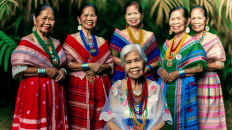The Philippines, a country known for its rich history and diverse culture, has a wealth of beautiful names that echo tales of traditions, family, and nature. When choosing a name for their child, many Filipinos often seek names with deep meanings or historical significance. Below, we’ll delve into 50 of the most popular Filipino girl names and uncover the beautiful stories they each carry.
Maria
Maria is undoubtedly one of the most popular female names in the Philippines. It is often used as a prefix to other names, like Maria Clara or Maria Teresa. Maria is derived from Hebrew, meaning “beloved” or “wished-for child”. Historically, it’s connected with the Virgin Mary, which holds deep religious significance for the predominantly Catholic Filipino population.
Luningning
Luningning is a name that truly captures the Filipino spirit. Meaning “brightness” or “brilliance”, it is often associated with the radiance of stars or the shimmering of precious stones. The name paints a picture of someone who stands out and shines brightly in whatever they do.
Mayumi
Derived from a Tagalog word meaning “modest” or “gentle”, Mayumi is a name that portrays humility. In Filipino culture, humility is a cherished trait. A girl named Mayumi is often seen as someone who possesses quiet strength and grace.

Ligaya
Ligaya means “joy” or “happiness” in Tagalog. It encapsulates the Filipino’s undying optimism and resilience amidst life’s challenges. Parents hope that a child named Ligaya will lead a life filled with joy and share that happiness with others.
Amihan
This name finds its roots in ancient Filipino mythology. Amihan refers to a bird and is also associated with the northeast wind. The name is symbolic of freedom and the boundlessness of the skies.
Dalisay
Originating from an old Tagalog word meaning “pure”, Dalisay epitomizes purity, innocence, and sincerity. Parents bestow this name upon their daughters in the hope that they uphold these virtues throughout their lives.
Mabini
Mabini is a tribute to Apolinario Mabini, a historical figure in the Philippines. Though it’s more common as a boy’s name, some parents name their daughters Mabini to instill a sense of patriotism and honor.
Liwayway
Liwayway translates to “dawn” or “daybreak”. It signifies hope, new beginnings, and the promise of a bright day ahead. A poetic and romantic name, it encapsulates the Filipino’s hopeful spirit.
Tala
Tala is the morning and evening star goddess in Tagalog mythology. As a name, Tala is often linked to a guiding star or a shining beacon in the night.
Rosas
Directly translating to “roses”, this name signifies beauty, love, and elegance. Just as roses stand out in a garden, parents hope their daughter named Rosas will bloom beautifully in life.
Bituin
Bituin means “star” in Tagalog, signifying a sense of wonder and celestial beauty. It echoes the Filipino’s fascination with the night sky and the stories woven around the constellations by their ancestors. A girl named Bituin might be seen as someone destined to shine and guide, just like the stars that illuminate the Philippine skies.
Hiraya
This unique name is derived from the phrase “Hiraya Manawari” which means “may the wishes of your heart be granted.” Hiraya reflects a deep-seated Filipino tradition of not just wishing for better things, but also the determination and the will to make these wishes come true. It embodies a blend of hope and action.
Mahalia
Though it has Hebrew origins, meaning “tenderness” or “affection,” Mahalia has found a home in the lexicon of Filipino names. It evokes a sense of warmth and genuine love. In the Filipino community, such a name would be associated with someone who is kind-hearted and compassionate.
Diwa
Diwa is a Tagalog word that means “spirit” or “thought”. In naming their child Diwa, Filipino parents may hope to inspire a thoughtful and reflective nature. It is a name that speaks to the inner soul and intellect of a person.
Isay
This name is often a shortened form of Isabel or Isabella, but in the Philippines, it has taken on its own charm. It signifies a person who is devoted and strong-willed. Isay is a name that is both traditional and modern in its simplicity.
Jasmin
Reflecting the jasmine flower, this name signifies purity, simplicity, and warmth in Filipino culture. It is often given to girls in the hope that they will embody the sweet and pleasing nature of the flower.
Kasandra
Derived from Greek, but common in the Philippines, Kasandra means “shining upon man.” It is a name that suggests brilliance and clarity. Filipinos often give this name to their daughters to signify a life filled with light and insight.
Lualhati
A name that means “peaceful happiness” and “serenity,” Lualhati is a traditional Filipino name that captures the culture’s deep-seated values of harmony and contentment. It is a name that speaks of calm and a life free of turmoil.
Marikit
Marikit is a Tagalog word for “beautiful” or “lovely.” It’s a name that celebrates the beauty of the Filipino people and the aesthetic virtues they hold dear. It’s often hoped that a girl named Marikit will not only grow up to be physically attractive but also possess a charming personality.
Nimfa
With roots in mythology referring to nymphs, Nimfa captures the enchanting and mystical charm that such creatures are known for. In the Philippine setting, a Nimfa is someone who is alluring and captivating in her ways.
Osang
Osang is an endearing nickname often used on its own. It carries a sense of warmth and closeness, portraying someone who is much loved by those around her. In Filipino communities, Osang is associated with a nurturing and kind-hearted personality.
The name Pia has Latin roots meaning “pious” or “devout”. It is popular in the Philippines, perhaps due to the country’s strong Catholic heritage. A girl named Pia might be seen as someone of deep faith and spirituality.
Quianna
With origins in the native languages, Quianna means “light” or “clearness”. It reflects clarity of thought, purity, and brightness. Parents might name their daughter Quianna with the hope that she’ll be a beacon of light and wisdom in her life journey.
Rosalinda
Combining the Spanish words for “rose” and “beautiful”, Rosalinda is a name that exudes elegance and grace. It carries an old-world charm while remaining timeless. The name signifies a blend of beauty both in appearance and in spirit.
Sari
A name of Indian origin, Sari means “essence” or “core”. In the Philippines, it’s reminiscent of the word “sari-sari” which means “variety” and is commonly associated with local convenience stores. The name evokes a sense of diversity, vibrancy, and heart.
Tinay
Tinay is a loving diminutive, often used to express affection. While it doesn’t have a specific meaning, its use in the Filipino culture is reminiscent of warmth, closeness, and familial bonds.
Ulan
Ulan means “rain” in Tagalog. It signifies blessings, life, and growth. In a tropical country like the Philippines, rain is both a life-giving force and a symbol of renewal. Parents might hope for their daughter to bring abundant blessings and refreshing changes wherever she goes.
Vida
Vida has Spanish roots meaning “life”. Popular in the Philippines, it symbolizes vitality, joy, and zest for living. A girl named Vida is imagined to lead a fulfilling and spirited life, touching others with her vibrancy.
Wena
Wena is a unique name without a specific Filipino origin, but it’s popular in the country. Often it is associated with someone who is special, different, and destined to stand out.
Xyrene
Though not traditional, the name Xyrene has gained popularity in the modern Filipino naming landscape. The uniqueness of the “X” beginning sets it apart. The name might be associated with individuality, strength, and modernity.
Ysabel
Ysabel is a variant of the name Isabel, which has Hebrew roots meaning “God is my oath”. In the Philippines, Ysabel holds an old-world charm, reminiscent of the Spanish colonial era. Parents might bestow this name upon their daughters, hoping they lead a life of promise and commitment.
Zamara
While not rooted deeply in traditional Filipino culture, the name Zamara has a rhythmic allure. Its origins are diverse, but in a Filipino context, it evokes mystery, depth, and beauty. It could be related to someone who possesses a captivating and enchanting aura.
Ailene
Ailene is a name that sounds modern but has deep roots. Its charm lies in its simplicity. Often in the Philippines, Ailene symbolizes a blend of tradition and contemporary spirit, representing a girl who respects her roots while looking forward.
Bianca
Of Italian origin, meaning “white” or “shining”, Bianca has become popular in the Philippines. It evokes purity, clarity, and innocence. Filipino parents might see Bianca as a name symbolizing grace and elegance in simplicity.
Cheska
A diminutive of Francesca, Cheska has found its place in the hearts of Filipinos. It’s youthful, lively, and endearing. Cheska is often associated with someone who’s vivacious, spirited, and full of life.
Danica
With Slavic roots meaning “morning star”, Danica in the Filipino context might be associated with hope, new beginnings, and the promise of a brighter day. Parents might wish their daughter to be a beacon of optimism and inspiration.
Ela
Ela is a name that exudes grace in its brevity. While it might be a shortened form of names like Eleanor or Elaina, in the Philippines, Ela stands strong on its own, representing someone who’s genuine, uncomplicated, and sincere.
Fiona
Although of Gaelic origin meaning “white”, “fair”, Fiona has found popularity in the Philippines. The name is associated with someone who has a pure heart, gentle spirit, and a touch of elegance.
Giselle
Giselle, of French and German origin, means “pledge” or “hostage”. In the Philippines, it’s more positively linked to commitment and dedication. A girl named Giselle might be seen as someone who values bonds and promises, standing by them with unwavering commitment.
Halina
Halina is a name that beckons and invites. In Tagalog, it’s an imperative verb that means “come”. Parents naming their daughter Halina might hope she possesses an inviting personality, one that draws people towards her with warmth and love.
Imelda
Imelda might immediately remind many of the former First Lady of the Philippines, but its roots are deeper, with origins from Germanic elements, meaning “universal battle”. In the Philippines, it evokes feelings of grandeur, strength, and determination, perhaps due to its historical association.
Jolina
Jolina is a name that carries a melodious sound and is quite popular in the Philippines. It doesn’t have a specific native meaning, but its charm and simplicity have endeared it to many Filipino families. Jolina resonates with vivacity and cheerfulness.
Krizia
Derived from the name “Christ”, Krizia signifies a follower of Christ, echoing the Philippines’ strong Christian traditions. Parents might bestow this name on their daughters hoping they lead a life filled with faith and spirituality.
Lorin
Lorin is a name that exudes sophistication. While its roots are not intrinsically Filipino, its popularity in the country has grown over the years. A girl named Lorin might be perceived as someone graceful, cultured, and refined.
Mayumi
A beautiful name of Japanese origin, meaning “gentle truth”, Mayumi has been embraced by Filipinos. It captures the essence of someone who is modest and possesses a quiet strength. In the Filipino context, Mayumi represents a blend of gentleness and authenticity.
Nadine
Of French origin, meaning “hope”, Nadine has found a place in the hearts of Filipinos. The name carries with it an aura of optimism and aspiration. In the Philippines, a girl named Nadine might be seen as someone brimming with hope and positivity.
Oriana
With Latin roots meaning “dawn” or “rising sun”, Oriana is a name that symbolizes new beginnings and bright futures. In the Philippines, Oriana might evoke feelings of renewal, growth, and a fresh start, representing the country’s optimism and resilience.
Patrice
A variant of Patricia, meaning “noble”, Patrice has a universal appeal. In the Philippines, it is associated with someone who possesses dignity, honor, and a regal nature. A girl named Patrice is perceived as someone of high esteem and respect.
Queenie
As the name suggests, Queenie signifies royalty and leadership. In the Filipino context, it’s not just about rulership but also about nurturing, guidance, and being a beacon for others. Parents might name their daughter Queenie hoping she’d grow with a regal, compassionate demeanor.
Rica
Rica is a name of Spanish origin meaning “rich” or “wealthy”. In the Philippines, wealth is not just seen in terms of material possessions, but also in richness of heart, spirit, and culture. Thus, Rica can symbolize someone abundant in love, kindness, and cultural values.
The beautiful thing about names in the Philippines is the blend of indigenous, Spanish, and global influences that come together to form a unique identity. Whether it’s the hope-filled Nadine or the culturally rich Rica, Filipino girl names are more than just words. They’re a testament to the country’s resilient spirit and diverse heritage.


















Add comment